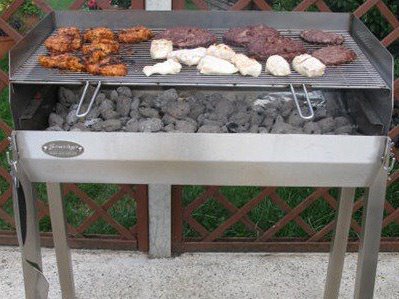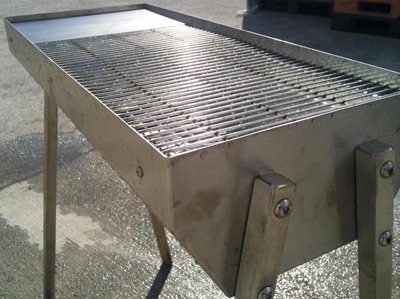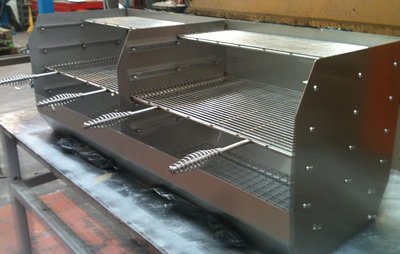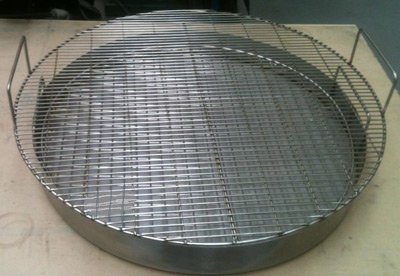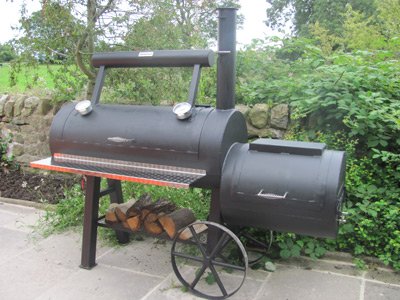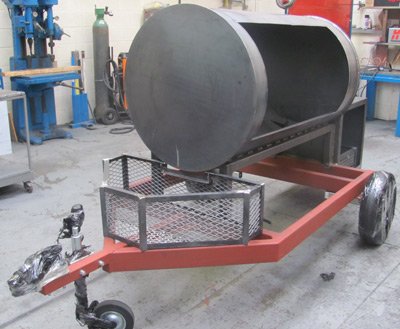- Recipes Home
- Beef
Barbecue Beef Recipes For Grills & Smokers
Use my barbecue beef recipes for your grill or smoker and get more out of your next BBQ cookout.
Beef on a barbecue grill doesn’t have to be about frozen burgers. Here’s some easy barbecue beef recipes that will transform your cook out into the talking point of the social calendar.
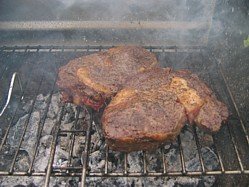
I like to keep my beef recipes clean and simple with quality fresh ingredients. For sure, I’ll give you some exact measures on the fundamental ingredients but don’t be surprised by measures such as “a splash of Tabasco”. After all what really matters is whether it tastes good to YOU!
Below you'll find some great barbecue beef recipes delivering the juiciest steaks you've ever tasted. Be sure to read my section how to grill steaks and here's a couple of extra tips to get you going:-
TIP 1 - Only season a steak on one side. The salt and pepper prevents the natural sugars mobilizing during cooking and it's this process that delivers the sweet flavour. The unseasoned side therefore will complement the seasoned side.
TIP 2 - Steak has to be cooked at a high temperature so don't continually turn it otherwise it won't get up to temperature.
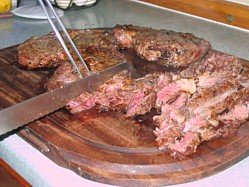
Barbecue Beef Recipes For The Grill:-
Barbecue Roast Beef - Three great ideas for beef on the spit roast.
Beef Fiorentina - Influenced by my friends and the Hosteria del Vignola in Vasto, Italy. Typically Italian, fresh and simple but still one of my favorite barbecue beef recipes bar none!
Grilled Ribeye Steak Recipes - from quick and dirty to how to make the best steak rubs.
Grilled Beef Sirloin - Seared until brown and then indirectly roasted with the lid down.
Grilled Filet Mignon - Wrapped in bacon for added flavor and succulence.
Grilled Fillet Steak - The fillet is marinated for several days in olive oil for supreme "melt in your mouth" tenderness and then served (optionally) with a rich Bearnaise sauce.
Veal Loin - Now ethically reared, this one is for loin chops.
Spit Roasted Veal - Simply seasoned rolled joint on the rotisserie. One of my favorite ways to eat veal.
For the healthy ones among us how about a beef salad straight off the grill?
Thai style roast beef salad - Seared beef with a oriental twist makes for a really tasty offering.
Italian style roast beef salad - It's the vinaigrette that adds the finishing touch for perfection.
BBQ Beef Satay Salad - If you're into peanuts then this one's for you!
Leftovers? Crack on for the best barbecue beef sandwiches.
Barbecue Beef Recipes For The Smoker:-
Smoked Brisket Recipes - 2 stunning recipes to choose from
Texas Smoked Brisket - A "full on" marinade makes this to die for. Long and slow does it again!
Chuck Roast - How to use your to tenderize this cut and create a low cost cookout either direct grilled or indirectly low and slow.
Smoked Tri-Tip Recipe - Following a recipe request from Richard Ward in California here's my version of the Santa Maria steak.
Barbecue Beef Recipes for the Kamado Ceramic BBQ:-
It's not just about the flavouring. The type of equipment that you have also determines the best way to cook beef.
Hamburgers - Use your kamado to make the most out of your burger.
Steak - It's the best way to cook steak, bar none.
Traditional Roast Beef - Use your kamado like an oven, but the results are streets ahead.
Plank Cooking Recipes:-
Plank Cooked Hamburgers
Barbecue Beef Recipes For The Hotplate Or Plancha:-
Quick Fried Steak - Like a "pierrade", sprinkled with salt, what could be easier?
My Best Grilled Hamburger Recipe - Spawned from the influence of steak tartare.
About Beef:-
The quality of your beef is dependent on all sorts of factors such as the age, breed and sex of the animal together with what is was fed on whilst alive. In addition you also have to consider the hanging, storing and cutting up of the joints so for this reason alone I always recommend that you use (and get to know) a butcher.
Your butcher will be more expensive than the supermarket but that's because your butcher will have hung the meat for a good length of time. Hanging adds flavor and it also dehydrates the meat so the same piece of meat well hung is going to cost more per pound compared to something that is full of moisture.
Beef should look fresh and moist, but not watery, with small flecks of fat "marbling" in the flesh. The natural color of beef isn't pink when it ages, it's more of a brown color (as the flesh is oxidized) so don't confuse this with meat that is rotten.
The amount of marbling (it's the fat that gives a lot of the flavor) is down in part to the feed. A grass fed animal will have less marbling than one reared on a grain diet. Many farmers today feed on grass and then grain for the final two weeks before slaughter and this seems to be a good mix. Again, ask your butcher, he / she should know all about the beef, where it came from and on what it was fed.
Current dietary advice is to eat less red meat both for our own health and for the environment. I'm no doctor so I'm not going to comment on the health issue but when it comes to the environment, I do believe that some beef is getting a bad rap.
Organic pasture fed beef is in my view the most environmentally friendly way to rear beef livestock. To be clear:
- Pasture as opposed to grass. Pasture contains naturally occurring grass, flowers, legumes which not only provides a much more varied diet for the cattle, it's also good for enhancing biodiversity.
- Organic. No hormones and not fed on agrochemical plants or feedstuffs. The cattle naturally enrich the soil by dropping the odd cow pat and massaging the land with their hooves.
I would argue that this type of agriculture and a diet including pasture fed beef has less impact on the environment than a wholly vegetarian / vegan diet where the consumer eats industrial scale monocrop produce. Note of course that there still health and ethical issues still remain.
To learn more about pasture reared livestock and where to buy here in the UK, check out the Pasture For Life association.
When choosing your cuts of beef the general rule of thumb is that cuts from the forequarter of the animal are cheaper, need longer cooking and are therefore ideal for smoking. Those from the rear quarters are more tender and best for direct cooking (grilling).
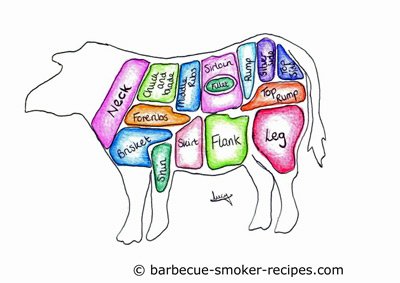
Cooking Beef:-
Always give your beef time to get up to room temperature before cooking especially if you're going to sear a steak for a short time because you want the internal temperature to warm as you cook the outside. Allow 1 hour for steaks and burgers but don't worry about a whole joint because the long cooking process makes the starting temperature insignificant.
It's important to ensure your food is properly cooked however beef is one of the meats that you can cook less than others and it is OK to serve pink in the middle.
Here’s the scientific bit! When cooking beef we’re protecting ourselves bacteria, the worst of which is e-coli, a bacterium that can live on the surface of beef but not inside. So provided beef is cooked all around the outside then it’s safe to eat.
Do remember however that because burgers and sausages are made from minced meat these do need to be properly cooked through because when the beef is ground, the exposed outer flesh is mixed in to the ground meat.
Barbecue Beef Sandwiches
When beef is cooked on the rotisserie it is still supremely moist and
with any luck you've still got some of the drippings in the tray. Save it and you can use it with leftover steak too.
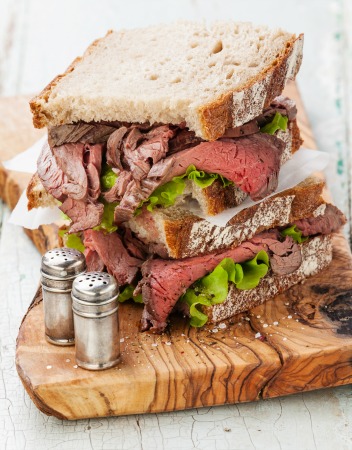
This is how I like to prepare my barbecue beef sandwiches:-
Serves:- 1 (I'm being selfish!)
Preparation Time:- 10 minutes
Cooking Time:- n/a
Total Time:- 10 minutes
Ingredients:-
- 2 slices crusty brown bread, thickly sliced
- 2 slices roast beef
- Green salad of your choice
- 1 teaspoon beef dripping
- ½ teaspoon English mustard (ready prepared)
- Salt and pepper
Method:-
Yes, constructing this roast beef sandwich is a process in itself so it deserves a method statement.
Rip up your beef slices. You can chop but ripping works better for me.
Take one slice of bread (this will be the base) coat lightly with the mustard and then lay your tatters of beef on it. Season well with salt and pepper.
Over the beef, add your greenery
Now take the top slice of bread, thinly spread the beef dripping and lightly dust with a little more salt. Slap this on top of the greenery and you're ready to go.
See Also:-
Information About BBQ Grills
Information About BBQ Smokers
Barbecue Accessories and Cooking Equipment
Buying Backyard Barbecue Furniture







